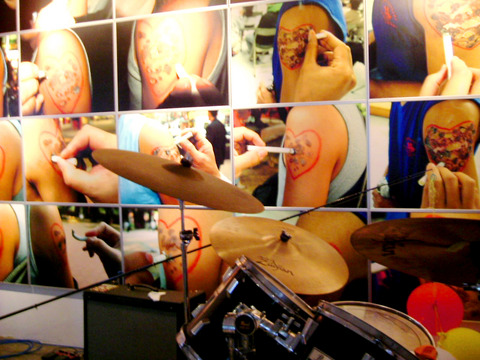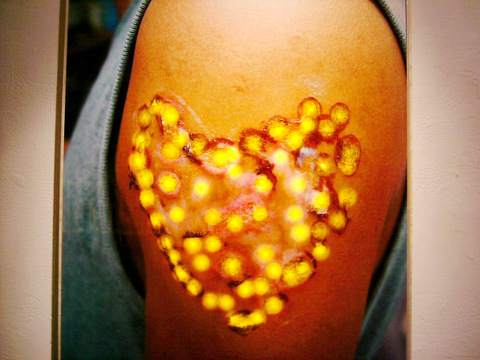If you're city-bound this summer, there are several refreshing art exhibitions to excite, soothe or even shock you. The works on view range from the lighthearted to the digitally interactive to outrageous performance art. In the exhibitions we see several art stereotypes: the professorial artist didactically telling his viewers about color theory; women as nurturers trying to give back to their communities; and the rock ‘n’ roll burnout artist.
Singing in Your Brain is Tsao Hsun-chih's (曹訓誌) first solo exhibition. He has four projects on display and takes a playful approach to dense color theory and ideas regarding perception.
The first work is a video of a woman singing the well-known Happy Birthday song, except there is no sound coming from her mouth. On seeing her mouth move, the viewer mentally fills in the melody. Tsao says suggestion is quite overpowering to the senses and that even though we use these faculties, we often do not pay much attention to them. Focusing on how our minds can fill in melodies or perceive color and sensations is a lot like “singing in one's brain.” In another room, Tsao uses two wall-sized projections to illustrate that point. In one, an optical illusion occurs as multicolored pixels seem to fill the screen, but the video was made with only two colors, red and green, and the mind is tricked into perceiving purple, yellow, orange, white, and gray.

PHOTOS: SUSAN KENDZULAK
Over at the Taipei Cultural Center is a small exhibition organized by Taipei Artist Village director, Su Yao-hua (蘇瑤華). Titled Women in Taipei it brings together three female artists who try to include community, family and place in their art. Hsu Chia-jung (許嘉容), the only featured artist to live in Taipei, uses her personal family photos to construct three-dimensional mannequins. Using transparent positive film, she stitches the snaps together and uses a light bulb placed inside the mannequin to create a glowing image.
Thai artist Teerawat Mulvilai exhibits the private journals of Southeast Asian women who have made Taiwan their home, while American Lexa Walsh exhibits her Immortalization Project in which she collects nostalgic objects from people and then conducts interviews to examine sentimental attachment. This modus operandi has become a trend at the Taipei Artist Village where visiting artists from around the world exchange personal mementoes with members of the local community.
In addition to the exhibition at the Cultural Center, the Taipei Artist Village runs a schedule of art, dance and performance programs that change monthly according to which artists are in residency at any given time. The artist village has a pleasant cafe with fresh baked goods so one can take a peaceful rest between gallery rounds.

At IT Park, performance artist Cheng Shih-chun (鄭詩雋) has become a transgressive rock star. Photos of a previous event show passers-by stamping out cigarettes into a heart shape drawn on his upper arm as if to say love hurts. To further make his point, photo lightboxes glow brightly where the embers burned his skin. A drum kit, guitars and amps are strewn throughout the gallery. This is no commercial exhibition, as sex toys, cash, and butts are the detritus of the painful and difficult passage of adolescence into adulthood.
Exhibition notes:
What: Singing in My Brain by Tsao Hsun-chih (曹訓誌)
Where: Sly Art Gallery, Lane 11, 15-2 Zhongshan Rd N Sec 2, (台北市中山北路二段11巷15-2號1樓)
When: Until Aug. 27What: Women in Taipei
Where: Taipei Cultural Center, Exhibition Room 3, (台北市立社教館第三展覽室2F), 2F, 25 Bade Rd Sec 3, Taipei (台北市八德路3段25號)
When: Until Aug. 31What: Cheng Shih-chun (鄭詩雋)
Where: IT Park, 2/3 F, 41 Yitong St, Taipei (台北市伊通街41號2-3摟) Tel:2507-7243
When: Tuesday to Saturday from 1:00pm to 10:00 pm; until Sept. 2

The primaries for this year’s nine-in-one local elections in November began early in this election cycle, starting last autumn. The local press has been full of tales of intrigue, betrayal, infighting and drama going back to the summer of 2024. This is not widely covered in the English-language press, and the nine-in-one elections are not well understood. The nine-in-one elections refer to the nine levels of local governments that go to the ballot, from the neighborhood and village borough chief level on up to the city mayor and county commissioner level. The main focus is on the 22 special municipality

In the 2010s, the Communist Party of China (CCP) began cracking down on Christian churches. Media reports said at the time that various versions of Protestant Christianity were likely the fastest growing religions in the People’s Republic of China (PRC). The crackdown was part of a campaign that in turn was part of a larger movement to bring religion under party control. For the Protestant churches, “the government’s aim has been to force all churches into the state-controlled organization,” according to a 2023 article in Christianity Today. That piece was centered on Wang Yi (王怡), the fiery, charismatic pastor of the

Hsu Pu-liao (許不了) never lived to see the premiere of his most successful film, The Clown and the Swan (小丑與天鵝, 1985). The movie, which starred Hsu, the “Taiwanese Charlie Chaplin,” outgrossed Jackie Chan’s Heart of Dragon (龍的心), earning NT$9.2 million at the local box office. Forty years after its premiere, the film has become the Taiwan Film and Audiovisual Institute’s (TFAI) 100th restoration. “It is the only one of Hsu’s films whose original negative survived,” says director Kevin Chu (朱延平), one of Taiwan’s most commercially successful

Jan. 12 to Jan. 18 At the start of an Indigenous heritage tour of Beitou District (北投) in Taipei, I was handed a sheet of paper titled Ritual Song for the Various Peoples of Tamsui (淡水各社祭祀歌). The lyrics were in Chinese with no literal meaning, accompanied by romanized pronunciation that sounded closer to Hoklo (commonly known as Taiwanese) than any Indigenous language. The translation explained that the song offered food and drink to one’s ancestors and wished for a bountiful harvest and deer hunting season. The program moved through sites related to the Ketagalan, a collective term for the